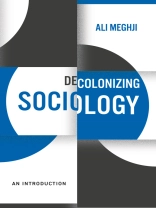Sociology, as a discipline, was born at the height of global colonialism and imperialism. Over a century later, it is yet to shake off its commitment to colonial ways of thinking.
This book explores why, and how, sociology needs to be decolonized. It analyses how sociology was integral in reproducing the colonial order, as dominant sociologists constructed theories either assuming or proving the supposed barbarity and backwardness of colonized people. Ali Meghji reveals how colonialism continues to shape the discipline today, dominating both social theory and the practice of sociology, how exporting the Eurocentric sociological canon erased social theories from the Global South, and how sociologists continue to ignore the relevance of coloniality in their work.
This guide will be necessary reading for any student or proponent of sociology. In opening up the work of other decolonial advocates and under-represented thinkers to readers, Meghji offers key suggestions for what teachers and students can do to decolonize sociology. With curriculum reform, innovative teaching and a critical awareness of these issues, it is possible to make sociology more equitable on a global scale.
Tabela de Conteúdo
Introduction: Sociology and Coloniality
1. The Decolonial Challenge to Sociology
2. Beyond Intellectual Imperialism: Indigenous and Autonomous Sociologies
3. Walking while Asking Questions: Towards a ‘Sociology in Conversations’
Conclusion: Sociology and the Decolonial Option
Sobre o autor
Ali Meghji is Lecturer in Social Inequalities at the University of Cambridge.












